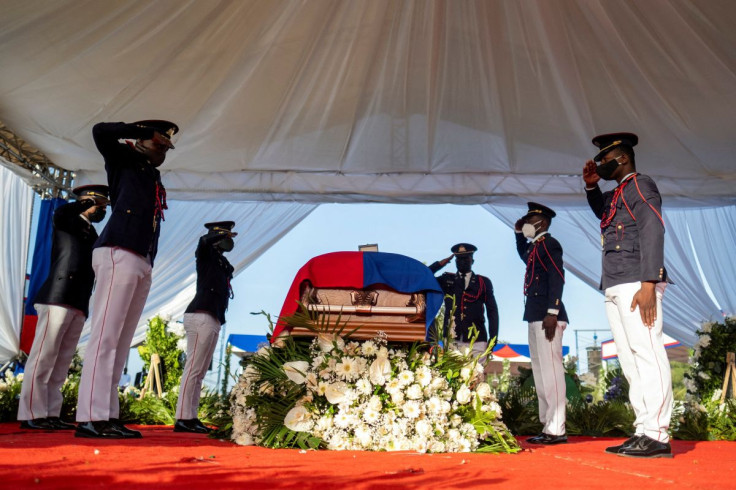Haiti Marks Anniversary Of Moise Murder As Gang Violence Spirals

Haiti on Thursday commemorated the one-year anniversary of the murder of President Jovenel Moise, whose killing created a power vacuum and allowed the country's gangs to expand their territory and even take over the headquarters of the nation's courts.
Haitian police have arrested more than 40 people but have yet to charge anyone in the murder, in which a group of gunmen that included former Colombian soldiers stormed Moise's home in a pre-dawn raid.
Last month a gang known as "5 segonn," or "5 seconds," took control of the Port-au-Prince Palace of Justice, the seat of the Haitian court system, dashing any remaining hope for progress in the investigation into Moise's murder.
"One year later, the investigation has not advanced," said Samuel Madistin, a lawyer who heads Haitian human rights group Clear Eyes Foundation. "There are people that have been arrested for a year who have never seen a judge."
Prime Minister Ariel Henry spoke at a ceremony at Haiti's national pantheon in Port-au-Prince, where a portrait of Moise was placed amid an arrangement of flowers.
"One year later, we are still in mourning," Henry said in a speech. "We are still struggling to understand this bloody and barbaric episode in our history."
Henry has faced accusations that he was involved in the plot, including by Moise's widow Martine, who was not present at Thursday's ceremony.
Her communications office last week said she would not join any ceremony led by a "Head of Government (who) is the subject of grave accusations about the assassination of the President of the Republic."
Henry denies involvement in the murder and insists his government is committed to bringing the killers to justice.
Kidnappings have spiked across Haiti since last year, while turf wars between gangs in April and May killed 150 people and forced some 10,000 from their homes.
U.S. prosecutors have charged three people with being involved in the conspiracy to kill Moise, but Haiti's probe remains stalled.
In a reflection of the broader collapse of Haiti's justice system, authorities have been unable to wrest control of the Palace of Justice back from the gangs who took it over in a shootout with police in June.
A gang leader known as Izo in a voice note circulated on WhatsApp said his group took over the Palace of Justice because he had been upset that authorities were not freeing jailed gang members despite his having made payments for their release.
State Prosecutor Jacques Lafontant last month said the recording would be transcribed and used as evidence against Izo.
Among those still jailed for their alleged role in the murder are a group of former Colombian military officers, who family members say have been denied due process and subjected to inhumane conditions.
Colombia's Vice President and Foreign Minister Marta Lucia Ramirez met in Bogota on Thursday with family members of the detainees.
"It's totally irregular that there are people detained for so long without us having any guarantees that the process is advancing," she said.
Haitian officials last year said 18 Colombians had been arrested and three were killed by police.
© Copyright Thomson Reuters {{Year}}. All rights reserved.





















